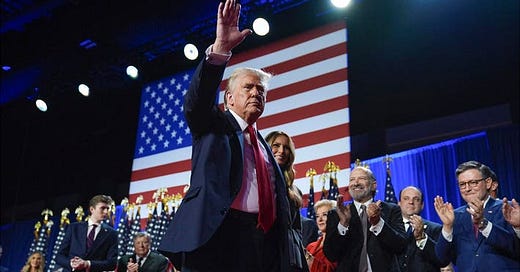How can Pakistan engage Trump 2.0?
Donald Trump is transactional and for Pakistan to be relevant for his administration, it must showcase alignment with key Trump priorities in the coming weeks.
As the dust settles following the 2024 presidential elections in the United States, focus is now shifting towards Trump 2.0 and his foreign policy priorities. Given all that is going on in the world, Pakistan is not going to be in the top foreign policy priorities for a Trump administration.
However, there are some immediate areas of priority for the incoming administration where Pakistan could signal its willingness to support the United States, and such signals would shift the administration’s perspectives on Pakistan.
1. Support Washington’s maximum pressure campaign against Iran.
Trump and his key advisors have made no efforts to hide the fact that Iran will be pressured in the coming months, both economically and militarily. On the economic side, Pakistan does not have much to offer, but it is on the military side where intel cooperation between Washington and Islamabad would be useful. It is likely that some of this is already happening, given that Iran has leveraged its influence in Pakistan to recruit fighters for conflicts across the Middle East.
In January 2024, Iran also carried out missile and drone strikes on Pakistan, which led to a swift and calibrated response by Pakistan, making it the first country since the Iran-Iraq war to hit Tehran in such a way. Given Iran’s role as a revolutionary actor in the region, Pakistan’s historic allies Saudi Arabia and the United Arab Emirates would also support Pakistan’s support in curbing Iranian influence. And since the royal families of both these countries are close to the Trump family, Pakistan could find its favorability rise in the White House should it signal a desire to deepen cooperation as it relates to Trump’s Iran strategy.
2. Openness to Abraham Accords 2.0
Trump has already spoken to the Palestinian president and “emphasized his commitment to the stop the war,” per Axios. He has signaled to Nethanyahu that the war in Gaza and Lebanon must end soon, and part of his engagement with the Arab-American community in Michigan also focused on ending the orgy of violence in the region.
Trump believes that one way to cement peace in the region is through economic integration and expansion of business ties. This, however, cannot happen in the absence of a ceasefire in Palestine and Lebanon. Part of the framework governing a ceasefire could be the presence of Arab and Muslim peacekeeping forces in Gaza - Pakistan’s openness to contributing to this mission could also be an important win for Trump and Pakistan’s Arab allies.
Should the administration succeed in brokering a ceasefire, focus will shift towards completing the unfinished business of the Abraham Accords, with Saudi Arabia’s recognition of Israel as the main priority.
As this conversation proceeds, Washington, Riyadh, and Abu Dhabi would want the world’s only Muslim-majority nuclear power to also join in. This was part of early discussions the last time around as well. Pakistan’s openness to playing a positive role in the next wave of the Abraham Accords, in alignment with Saudi Arabia, would be seen positively by Trump and his inner circle. As a result, the administration would be willing to look at Pakistan differently than the Biden administration, allowing both Islamabad and Rawalpindi greater room to maneuver externally.
3. Strategic shift on India
Trump loves the limelight, and nothing would excite him more than helping solve the decades-long India-Pakistan rivalry centered around Kashmir. He also has struck up a good relationship with Narendra Modi, which would create some direct openings for him to engage on this topic at the leadership level.
However, it is Pakistan that will have to make a major move on India before this goes anywhere, and even then, the India-Pakistan topic is likely to be a lower priority for Trump in the immediate term. However, since Trump and his inner circle believes in leveraging business and trade to bolster peace, a Pakistani move to reopen trade with India, and a climb-down from the Article 370 position on Kashmir, could lead to a change of dynamics across the board.
Such a move, coupled with clear signals to Trump and his inner circle that Islamabad wants Washington’s support to figure out a pathway towards peace and normalization with India, could lead to some unanticipated openings in terms of engagement. It should also be remembered that Pakistan’s historical allies in the Gulf, most notably the UAE, have been eager for Pakistan to pursue this path in the past as well.
Pakistan’s military can make these changes, but it will need a popular leader to convince the street.
Ultimately, the decision about the choices highlighted above must be made in Rawalpindi, not Islamabad. However, these are thorny topics that will require some level of public support. This is where Imran Khan comes in, given his mass popularity in Pakistan.
Should Mr. Khan signal a willingness to leverage his own political capital to rally public opinion towards dramatic shifts in Pakistan’s foreign policy, he and his party could find an ally in the Trump administration. There is already talk that leaders from the PTI are seeking to meet Trump’s inner circle, who are most certainly going to ask about what Khan has to offer to them.
Perhaps a signal that Khan is willing to collaborate with Trump on some of his top priorities, most notably Iran and the Abraham Accords, could tempt him to engage with Rawalpindi on Mr. Khan’s behalf.
For the Pakistani establishment, charting a new course with Washington following the end of the Biden administration should be an important priority. The challenge, however, is to find a way to align with a transactional president who has a particular vision of the region. Without such an alignment, Pakistan is likely to be out of sight and out of mind for Trump 2.0.




